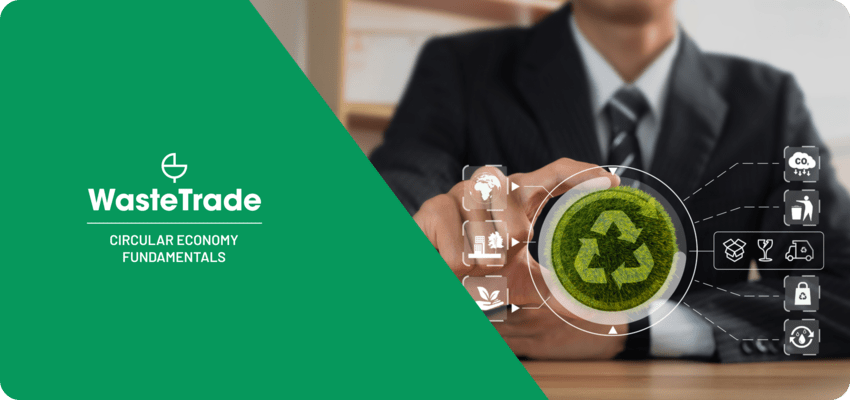Circular Economy Fundamentals

Welcome to an exploration of the fundamental aspects of the Circular Economy, a transformative concept reshaping our approach to waste materials. As a global waste marketplace, WasteTrade bridges the gap between buyers and sellers while exploring core principles and practical applications of the Circular Economy. Join us in understanding how this innovative approach is revolutionising sustainability practices and paving the way for a more efficient and environmentally conscious future.
Циркулярная экономика

The concept of the circular economy has gained momentum as a sustainable alternative to traditional production and consumption models. In a circular economy, resources are used and reused in a closed-loop system, minimising waste and maximising efficiency. This approach promotes material and resource regeneration, reducing the demand for new raw materials and lowering the environmental impact of industrial processes.
Designing products and systems with longevity and recyclability in mind is a key principle of the circular economy. This involves creating products that can be easily disassembled for reuse or recycling at the end of their lifecycle. By extending product lifespans through repair, refurbishment, and remanufacturing, businesses can reduce their environmental footprint and tap into new revenue streams. Embracing the circular economy drives innovation, fosters cross-industry collaboration, and contributes to a more resilient and sustainable economy.
Circular Economy Definition

A circular economy is a system designed to minimise waste and maximise resource use. It focuses on designing products for reuse, repair, and recycling rather than disposal after a single use. The goal is to create a closed-loop system where products and materials circulate continuously, reducing the need for new resources and preventing waste from ending up in landfills or oceans.
This sustainable approach not only benefits the environment by reducing pollution and conserving natural resources but also creates economic opportunities. By transitioning to a circular economy, businesses can innovate in producing and consuming goods, leading to cost savings, increased efficiency, and resilience against supply chain disruptions. Embracing circular economy principles contributes to a more sustainable and prosperous future for society.
Principles Of The Circular Economy
The circular economy is based on principles that reduce waste and maximise resource efficiency. Moving away from the traditional ‘take, make, dispose’ model, it aims to create a closed-loop system where products and materials are reused, repaired, and recycled. This approach promotes sustainability by extending the lifespan of products and materials, reducing the strain on natural resources, and decreasing landfill waste.
Designing products with longevity and recyclability is central to the circular economy. This involves using durable materials, eco-friendly production methods, and ensuring ease of disassembly for recycling. The focus is on creating systems where resources are used efficiently and continuously, reducing the need for new raw materials and lowering the carbon footprint of production processes. Businesses adopting these principles can reduce environmental impact, drive innovation, and create opportunities for sustainable growth.
Circular Economy Examples
The circular economy is gaining traction as a sustainable alternative to the linear economic model. One successful example is the fashion brand Patagonia, which encourages customers to repair and recycle their clothing. By offering repair services and using recycled materials, Patagonia extends the lifespan of its products and reduces waste. This not only lowers the company’s environmental impact but also promotes conscious consumer behaviour.
Another example is the partnership between Dell and Goodwill Industries. Dell collects used electronics for refurbishment and resale, while Goodwill provides job training and employment opportunities. This collaboration keeps electronic waste out of landfills and generates social and economic benefits for communities. By adopting circular economy principles, Dell and Goodwill create a sustainable and inclusive system that benefits both the environment and society.
